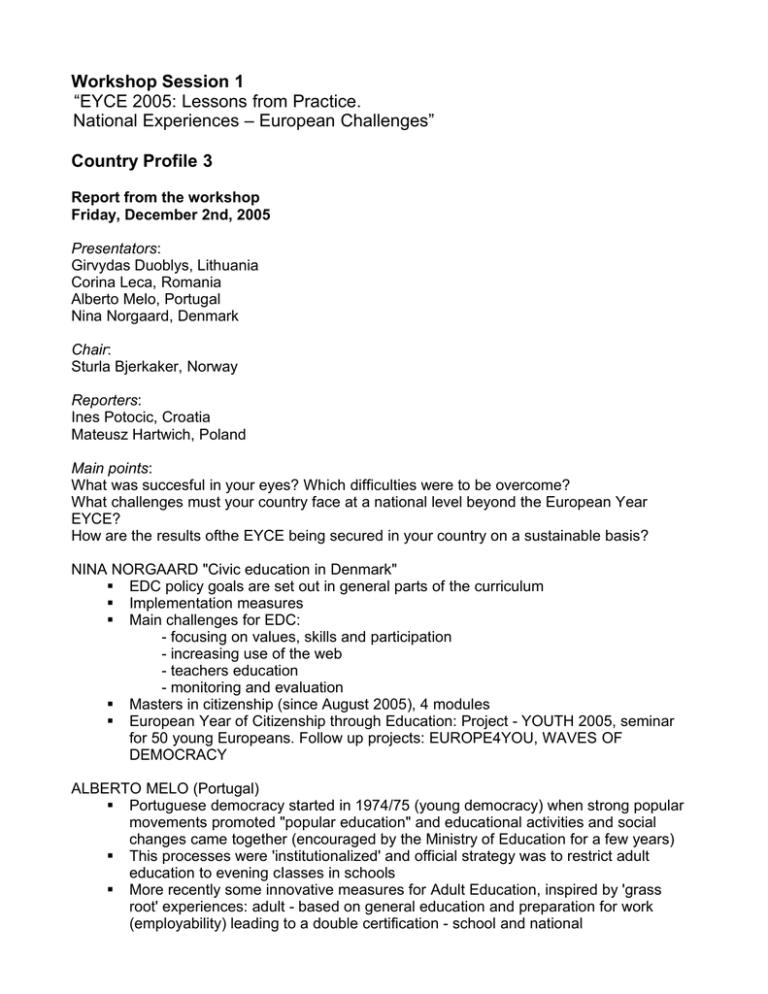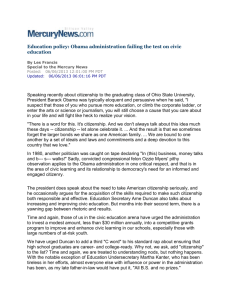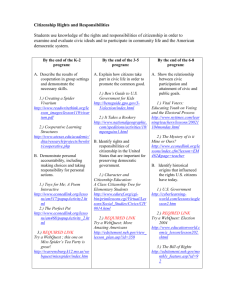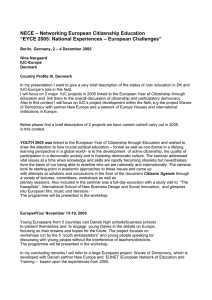Workshop Session 1 Country Profile 3 “EYCE 2005: Lessons from Practice.
advertisement

Workshop Session 1 “EYCE 2005: Lessons from Practice. National Experiences – European Challenges” Country Profile 3 Report from the workshop Friday, December 2nd, 2005 Presentators: Girvydas Duoblys, Lithuania Corina Leca, Romania Alberto Melo, Portugal Nina Norgaard, Denmark Chair: Sturla Bjerkaker, Norway Reporters: Ines Potocic, Croatia Mateusz Hartwich, Poland Main points: What was succesful in your eyes? Which difficulties were to be overcome? What challenges must your country face at a national level beyond the European Year EYCE? How are the results ofthe EYCE being secured in your country on a sustainable basis? NINA NORGAARD "Civic education in Denmark" § EDC policy goals are set out in general parts of the curriculum § Implementation measures § Main challenges for EDC: - focusing on values, skills and participation - increasing use of the web - teachers education - monitoring and evaluation § Masters in citizenship (since August 2005), 4 modules § European Year of Citizenship through Education: Project - YOUTH 2005, seminar for 50 young Europeans. Follow up projects: EUROPE4YOU, WAVES OF DEMOCRACY ALBERTO MELO (Portugal) § Portuguese democracy started in 1974/75 (young democracy) when strong popular movements promoted "popular education" and educational activities and social changes came together (encouraged by the Ministry of Education for a few years) § This processes were 'institutionalized' and official strategy was to restrict adult education to evening cIasses in schools § More recently some innovative measures for Adult Education, inspired by 'grass root' experiences: adult - based on general education and preparation for work (employability) leading to a double certification - school and national § § There are new Centers (based on contacts between Ministry of Education and civil society organizations) that assess and validate adults' prior learning Official framework is composed of 4 areas of knowledge/skills: 1. communication/language 2. mathematics for life 3. new information and communication technologies 4. employability and citizenship GIRVYDAS DOUBLYS (Lithuania) § Civic education in Lithuania has no problems at the moment; curriculum and text books are established, teachers and trainers are high quality § The biggest problem is that currently there is no real need for democratic way of thinking. Adults are very skeptical and they are not confident that they can change anything in their local community § Projects of school students' parliament (2000) with an idea that students should have the right to elect representatives who will carry out so me practical activities § 800 school took part in the project and 95 students were elected into a parliament with 2 sessions per year § It is the third year ofthe Students' Parliament in which they discussed some 'hot subjects' and now as the result, Ministry of Education asks the Parliament for its opinion on relevant issues § The result of existing school system is that citizens have not developed any social skills and civic competences, only building up their knowledge § Media is the important factor in civic education and in Lithuania they played a negative role § There was a project last year that produced every week an half hour television programme for adults to understand young people CORINA LECA (Romania) § European Year of Citizenship through Education largely mirrors the general image of civic education and human rights education in their formal and non-formal aspects § The national coordinating committee was created in February 2005 and has set up the following priorities: 1. promoting EDC and providing specific information for students, youth, civil society and the general public 2. teacher trainings 3. encouraging students' participation 4. developing specific EDC capabilities for non-governmental sector § The activities in Romania are: competitions between students, exhibitions, meetings of students' councils, conferences and workshops for teachers, school events and thematic camps for students etc. § Positive sides ofthis 'Iearning by doing' experience is an effective approach to democracy, experience in writing project proposals, refreshed energy to approach EDC education and existing curriculum for all students (1 hour per week) § The problems were lack of evaluation and monitoring at all levels and in all phases of a process, no coherent teacher training practices and low quality of institutional cooperation Discussion: Before the discussion the Chairman pointed out some questions that could be relevant for the discussion: § What terminology do we use and should it be defined (civic education, education for democratic citizenship etc.) § What about the sustainablitity of the actions? § How can we measure soft skills, measure citizenship? § Where do we go? What is there to be done? Important questions, that were discussed: § The Portuguese experience in school-based adult education bears a risk to rescholarize the process, which has to be rather life-based. Schools should be apart of local partnerships for adult education, together with NGO's and enterprises. Adults won't accept learning in school, if they rejected it in early years. § There is a link between fighting illiteracy and low qualifications and citizenship education. In Portugal there is an elite of maybe 20% who debates and discus on different issues. The other 80% don't read newspapers or books and so are excluded from the public debates. § How was the development of the democratic system in each country influenced by civic education? Was civic education apart ofthe improvement? § Mr. Duoblys underlined the importance of comparing live standards in transformation states and free market economies. Lithuanians from abroad had a big influence on the democratization process, since they knew what it's like to live in Western countries. § Civic education "given by the state" in younger democracies vs. reclamation of needs in countries like Sweden. There is no common ground yet. § Main interest of schools is offering jobs, not develop citizenship (Romania). § A way of learning democracy, experience democracy in a multinational context are cross-boarder meetings, like YOUTH 2005. "They came as Romanians or Danes and left as Europeans". It is an important role for the EU to play to stimulate these meetings. § It is also important to make it possible for older people to participate in cross-border meetings. The new Grundtvig proposals will start adult learners mobilit. § How can we help bridge the gap between "private democracy" and institutionalised? It is a key role of politicians to motivate citizens to be active within the society. § There is a shift in education, from state created policy to buttom-up processes, politicians should only create the framework for action, not take the leadership. European institution ask NGO's for opinions in creating new programms. § There is an important shift from education, as an inherent nation-state based concept to learning as a democratic, transnational concept. "Learning needs no curricula". § There is a need to work on a common terminology to avoid misunderstanding. Maybe the educators in citizenship education would need a "reflection period" too. As a conclusion Mr. Bjerkaker quoted a sentence from the speech held while the HolbergPrice was given Jürgen Habermas this year: "... For his fight for a never-ending dialogue". That is an important goal for citizenship education actors.






